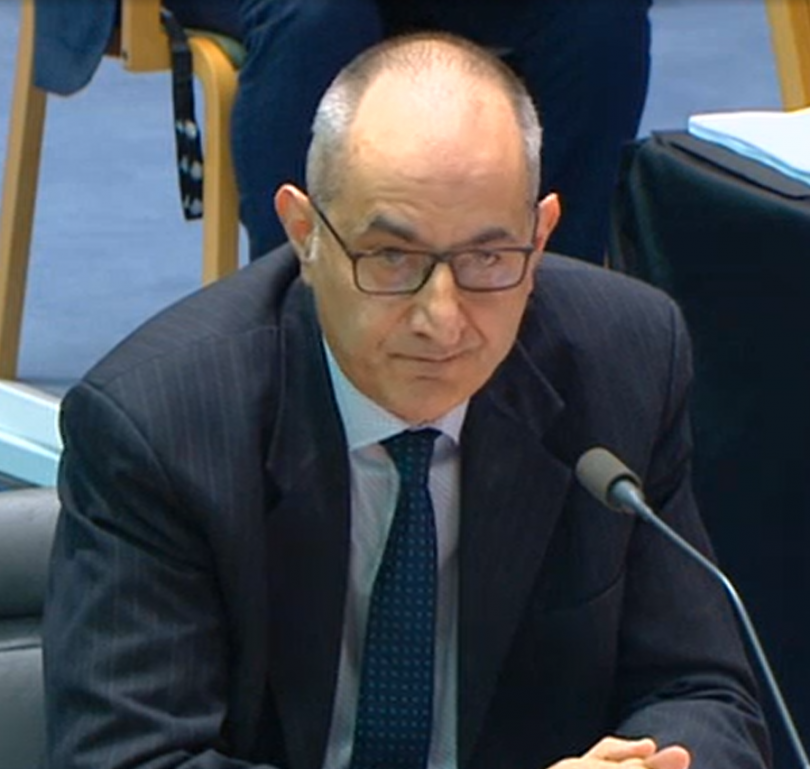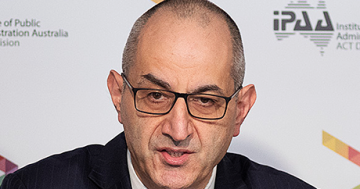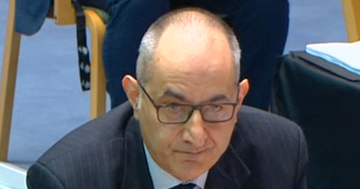
Mike Pezzullo has shared his views on the prospects of war. Photo: File.
Former Home Affairs secretary Mike Pezzullo, who was also the lead author of the 2009 Defence White Paper, can’t be silenced on his views about the prospects of war.
He has suggested an “eminent persons group” be established to mentor a strategic assessment of the likelihood of war in the region and what extra preparations might be required.
His proposal is outlined in a lengthy commentary in the current edition of the Australian Strategic Policy Institute’s (ASPI) journal The Strategist.
His idea is for the eminent persons group, which would be external to the government, to consist of all “living former deputy secretaries of defence strategy and former vice chiefs of the Defence Force”.
Mr Pezzullo is himself a former deputy secretary for strategy of the Defence Department.
Referring to the group as an “all-star” union, Mr Pezzullo said it could guide and mentor the strategic assessment project, which would be conducted by “the best and brightest Australian minds from think tanks and academia, as well as serving Australian Public Service and Australian Defence Force members”.
He suggests the assessment exercise can be conducted by ASPI in partnership with the Australian National University’s National Security College and the Strategic and Defence Studies Centre.
“One way in which to better inform the Australian public of what might lie ahead would be for a rigorous independent and public strategic assessment of the prospects of war to be conducted outside of government,” Mr Pezzullo wrote.
“Such a strategic assessment could be based on publicly available material, and would not have to rely on classified information.
“Conducted with an eye to Australian perspectives and interests, such a strategic assessment could make a real difference to public understanding, by raising awareness of the relevant issues and choices.”
He said the strategic assessment would be tasked with answering three broad questions:
- Using an estimative process, what are the probability ratings of crisis, confrontation and conflict (including major war) in the Indo Pacific between now and 2030?
- Using scenario-based gaming techniques, how might such a war be triggered and unfold, how might it be conducted, and how might it end?
- What would be Australia’s strategic interests in these contingencies, and flowing from those interests, what courses of action would be open to Australia, including in relation to both lessening the risk of war, and preparing for war, should it come?
“This is but an idea. Better ones might be suggested,” he said.
“Anything would be an improvement on the tiresome and reductive commentary by categorisation (namely the trope of ‘hawks versus doves’) that dominates and blights Australian strategic discourse.
“By bringing different perspectives together, and engaging in a contest of estimates and ideas, we might stand a better chance of being vaguely right, rather than exactly wrong, on the question of war and peace in our region.”
The former secretary also proffered probabilities for three war scenarios over the course of 2024-30.
One is a crisis in the Indo Pacific region, similar to the Cuban Missile Crisis of 1962, which he says is at least a 50 per cent chance.
A military clash between US and Chinese forces involving an exchange of fire, followed by rapid de-escalation, “which would be unlike anything that occurred in the Cold War” has at least a 30 per cent probability.
And a major war, similar to the Pacific War of 1942-45, sits at 10 to 20 per cent.
“If these estimates are ‘vaguely right’, then we should be preparing urgently, lest we find ourselves being proven to be ‘exactly wrong’ and thereby surprised, and worse,” he wrote.
“The prospect of war challenges the intelligence process and policymaking alike. War challenges widely held assumptions about rationality and the assumed benefits of peace.”
Mr Pezzullo was sacked as Home Affairs secretary late last year after it was revealed he used his close relationship with Liberal Party powerbroker Scott Briggs to influence appointments and policy under former Coalition governments, allegedly sending more than 1000 encrypted messages to the influential NSW Liberal figure over a five-year period.
















